#things have been really bad
Explore tagged Tumblr posts
Text
a bit of an update because i havent finished art yet. things have been strange for me. med changes have been giving me crazy mood swings and panic attacks, I was able to see my psychotherapist the other day and I'm looking into new psychs that I can afford who can hopefully help sort out my medication situation. I'm still working, I'm still doing my best it's just that my best is really not a whole lot right now... Once my medication issue gets better I'll be getting things done faster. thanks for sticking with me :(
#sunflower posts#things have been really bad#and on top of the medication issues im having a lot of really concerning problems but still cant get to the dermatologist...#the problem has been getting worse really fast and it's really worrying me :/
7 notes
·
View notes
Text
I like to think that Vulcans who come to understand that Humans just can’t try to process emotions the same way as them, it’s just healthiest to let it out in harmless ways, decide that venting and stuff should be taken just as seriously as Vulcan’s meditation time, and will encourage the Humans around them to complain about what’s upsetting them
People who are used to aloof Vulcans who avoid Humans at all cost running into one comforting a Human
“-and then they said my cheesecake was subpar, and they didn’t even bring a dish!!!”
“The purpose of this event was that every participant brings a food item of sorts, correct?”
“Yeah!!”
“And they did not follow this rule while insulting dishes that were brought?”
“Mostly just my dish but yeah >:(“
“How illogical”
“That’s what I’m saying!!!”
#star trek#Vulcans#Humans#not based on a specific thing#but I used to know this annoying couple that were ‘family friends’#who would show up to potluck dinners and the like and would either bring nothing or bring something really just. out of left field?#like a bag of frozen chicken to a bbq#and then proceed to make sure they are first even if it was stated to let kids go first#would take HUGE amounts before anyone else got a chance to get a plate#and then make off with the leftovers again even if they were already claimed for#and it wasn’t a food insecurity thing trust me I would never speak bad about a person getting food if that was even a remote chance#the adults who raised us knew them really well and we’d been to their house a ton of times#they were just dicks#and yeah. they’d occasionally insult the food. while eating the MAJORITY of it.#it was so weird at their home they would go out of their way to get the healthiest options possible#you know the really bland tasteless expensive stuff that apparently was healthier#but then if they were visiting our house they would. eat all our unhealthy snacks.#that always pissed me off so much as a kid because we actually had a food insecurity thing going on#and also a variety of other reasons that are a bit too depressing to bring up on this post#but anyways we’d hardly ever get to have nice snacks#and this couple would just take them all??? even after we’d tell them repeatedly that it was ours and those snacks weren’t gonna be#replaced#hated that couple#if you’re wondering why they were ‘family friends’ it’s because the couple who raised us#(it feels weird to type it out like that but apparently legal guardians doesn’t fit since they never finished petitioning 💀)#liked having them around because it made them look like ‘such great Christian’s’ being nice to the people#that no one else wanted to be friends with#I always thought that was a really weird and fucked up reason to be friends with someone#this got long sorry 😭
28K notes
·
View notes
Text
Birds of a Feather previous / next
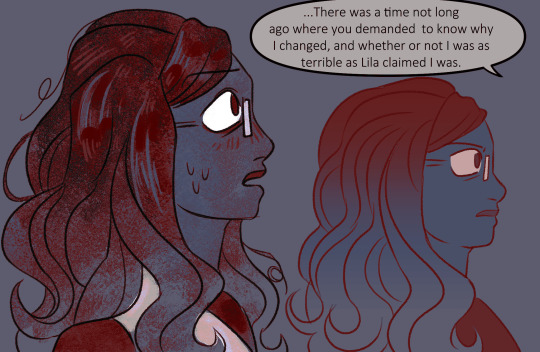
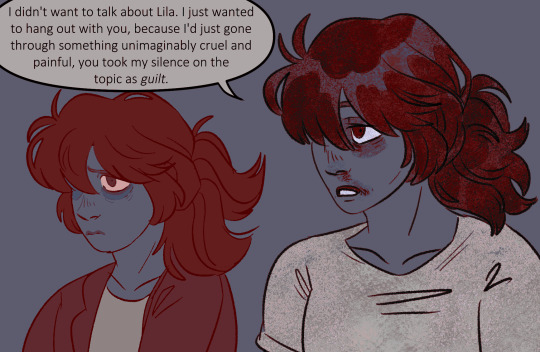


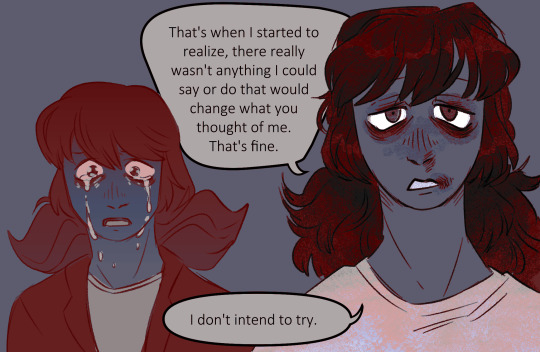
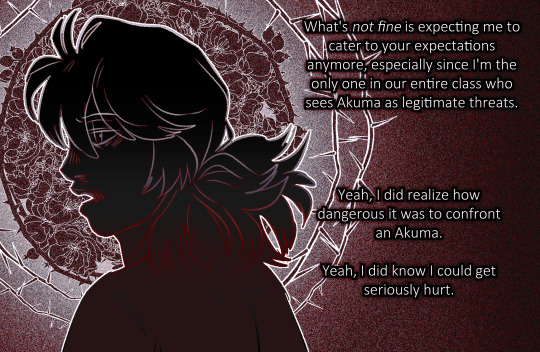


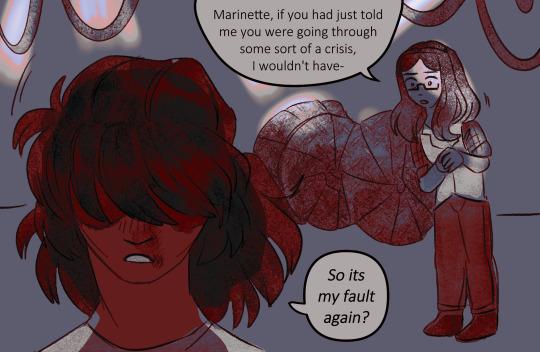
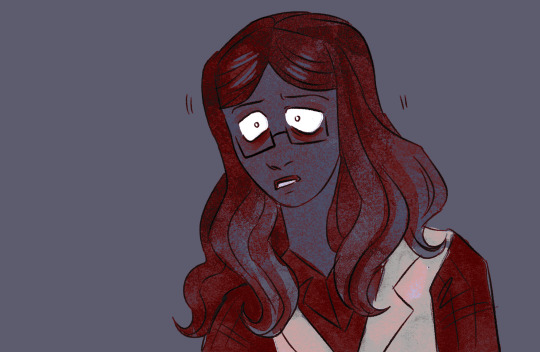




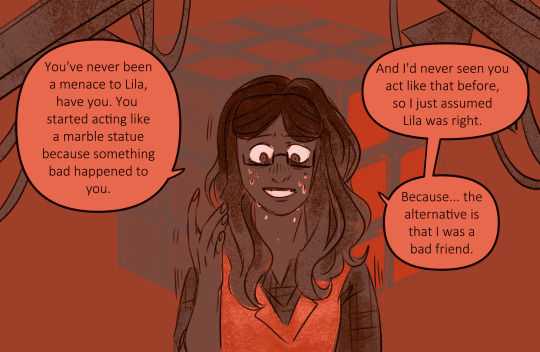
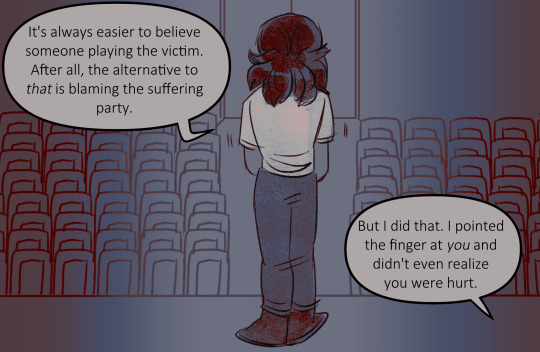
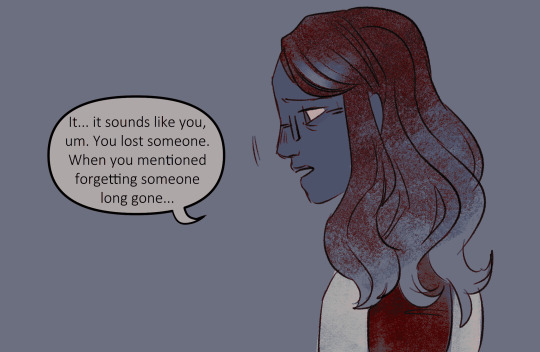
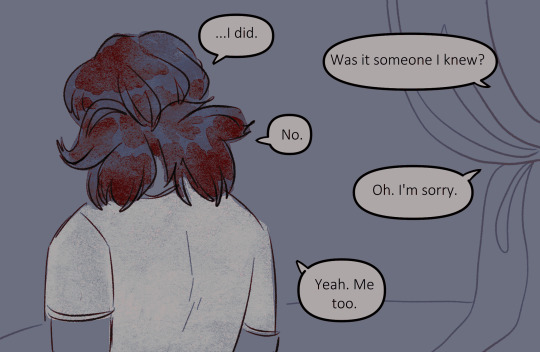
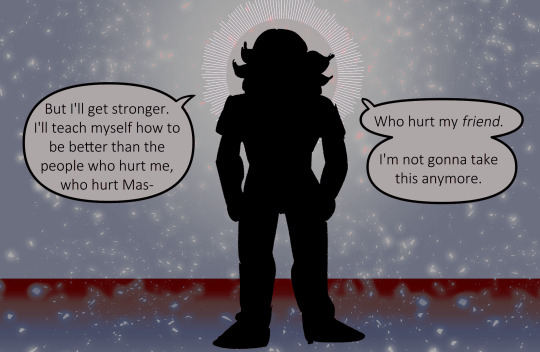
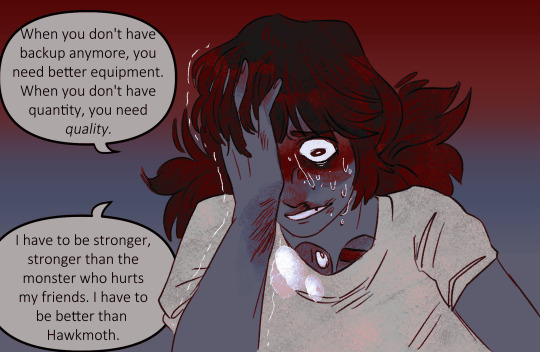

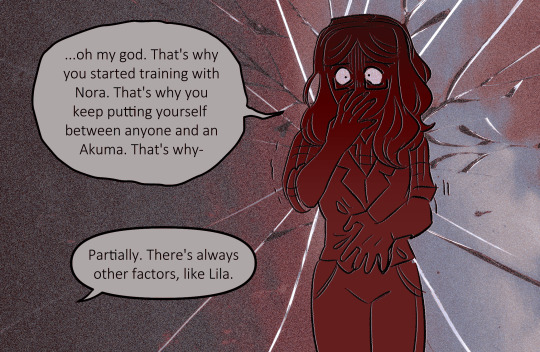


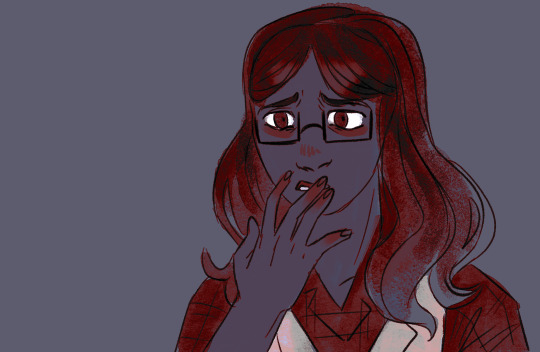
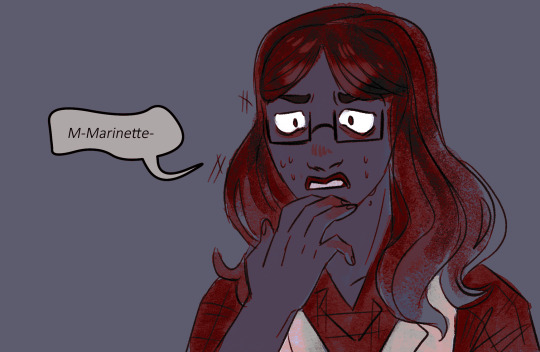

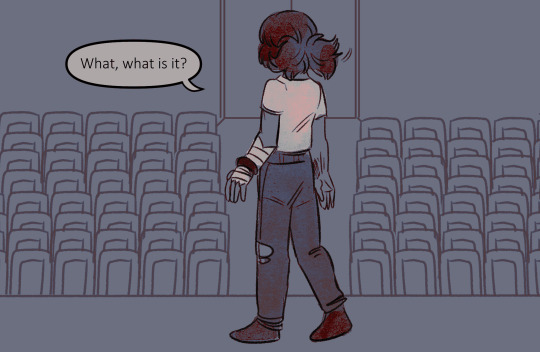
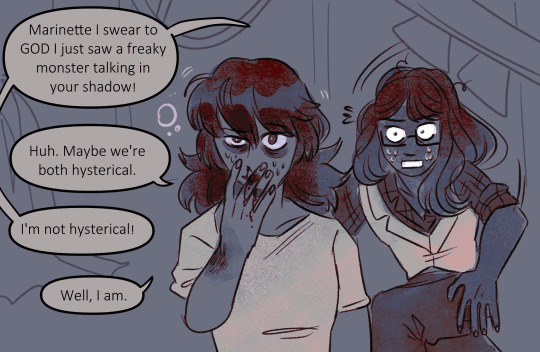
#my art#feralnette au#birds of a feather#long tags#sorry I went apeshit in the tags#LETS SAY IT ALL TOGETHER NOW#I - M - A - G - OOOOOOOOO#its fun drawing marinette's back to Alya and having her appear stout and unstoppable and totally logical#and then you see her face and she's like two seconds from completely snapping and is keeping it together by a thread#as a note just because mari feels very certainly abt smth doesnt mean she's right. feelings can be valid and also irrational#in the throes of grief she decided it was better to be alone than to lose someone again so she started pulling away#and lila made pulling away very very very easy to do#shes also vaguely aware she's being unfair in pinning this on alya which is why she started spinning the drain on cockmoth again#legitimately all the shit that's happened to her wouldn't have been so catastrophic if he was never in the picture and she knows it#but the bitterness of her bestie choosing a fantastic liar over her at the worst of times stiiiiiings#alya's personal timing was bad but lila really took advantage of the fact that marinette had been acting off and weird#she basically clocked marinette as being unstable from SOMETHING and made up a lie about her#knowing she wouldn't have the strength to defend herself#between her social life going tachy bc of lila and losing fu in a way that felt like personhood death marinette was really put on the spot#and alya doing her thing of busting in there and assuming her bias is correct was a terrible combo#essentially marinette is highly unstable and alya is just realizing that#busting in and giving her a lecture when she's slightly hysterical and definitely delirious from exhaustion is NOT the way#to show her she's self sabotaging#cuz thats just gonna make her double down on self sabotaging. bc marinette will not accept that she is also a CHIIIIILD
5K notes
·
View notes
Text
weird hearing "were you a Theatre Kid" "were you a Sports Kid" "were you a Choir Kid" "were you a Dance Kid" bc no? i mean i did all of that and more but resented ever minute of it? actively avoided sticking with anything? i was a "In This Family After School Activities Are Mandatory Kid"
#oh and i was really really bad at all of it btw#which was a good thing actually otherwise i would have gotten bored even *more* quickly#christ if i was good at a Activity i probably would have had to stick with it#that would have been EXHAUSTING#i survived soooo many Activities by standing in the background doing the bare minimum so I could focus on the Hyperrealistic Daydreams#baseball was my favorite. if u wear a glove u can literally just stand in the back of a field & stare at grass & no one bothers you#i mean usually no one bothers you but there is one specific situation where everyone starts yelling your name real loud and pointing
7K notes
·
View notes
Text

they tried to rebrand as The Criminals but riz is literally the city council's treasurer and also turns out people in their late 20s don't really name their friend groups. so now they're The Intrepid Heroes
#fantasy high#figueroth faeth#kristen applebees#adaine abernant#gorgug thistlespring#fabian seacaster#riz gukgak#yes this is sorta from the same thing Ive been doing for future!riz lol. that riz is the same design basically#just the above board sona#u can kiiinda tell which of the bad kids I have a very clear vision for their future design and which I kinda wing it for lol#kristen's tank top is white and the coat is galaxy tie dye btw. I didnt have the energy to express that in ink but thats the ult version#adaine I truly imagine to grow up to be the perpetual t shirt and jeans person but she carries her sword everywhere#gorgugs truth is that shes just hot she can wear anything. but I do give him the skirt hike bc I love him#I really like skirt hike... such a fun thing to put in designs. if ur garment has no variance in how it falls or drapes u can do it urself#this is also a little bit of an exercise in how much of an accessory I can freehand from memory#fig's bass I straight up did not fact check for. just rawdogging it memory only. same with fandrangor and adaine's crocs#I did write in my funny little document that gorgug takes up baking and is good at it bc I think itd be good for him#to do basically chemistry and math that also feeds people#out of them... kristen and riz would be Good good at it. but riz would get way too stressed abt the recipe and kristen bakes by#eyeballing the texture. fabian likes decorating but refuses to get anywhere near the heat of an oven. adaine isnt good at it first try#and is like well my effort goes to other things actually. fig Loves baking and Nobody lets her into the kitchen#idk why this manifests so clear in my head. must be bc of recent foccacia events#living in the subtropics is hell for baking nobody try it ok? I tell u
1K notes
·
View notes
Text
a bit of a personal ramble because fuck it, i’m posting whatever i want on here:
the past couple years have been some of the most difficult of my life. my mom being unexpectedly hospitalized twice, the worst creative burnout of my career, the grief of reading the news about palestine every day, deep rooted anxieties about not being good enough resurfacing at an all time high, and realizing i was unhappy around people i thought i’d love forever. without getting too dark, i’d never felt more hopeless.
but even through all of that, even with the state of the world right now and the impending doom of waking up each day, i think this might be the most fearless i’ve felt in a very long time.
i just want to be alive and create and build community and share a space where we all still feel hope for our world. and that’s what i’m going to do, through the fear, through all the shit of life, i’ll be here.
#tldr#i’m getting my personality back#i know i don’t owe anyone an explanation#but if you’ve been wondering why i’ve been so absent from youtube this is why#it’s been a very bad time#but i truly do feel so much better now#and i miss you all so much#and i’m so grateful to have our community#and i never want to take it for granted#i’m excited to try new things#share new projects with you!!#sorry i’m getting really sappy#but i love you all deeply#and it feels so good to feel alive again#a clockwork ramble#that’s gonna be my new tag
355 notes
·
View notes
Text
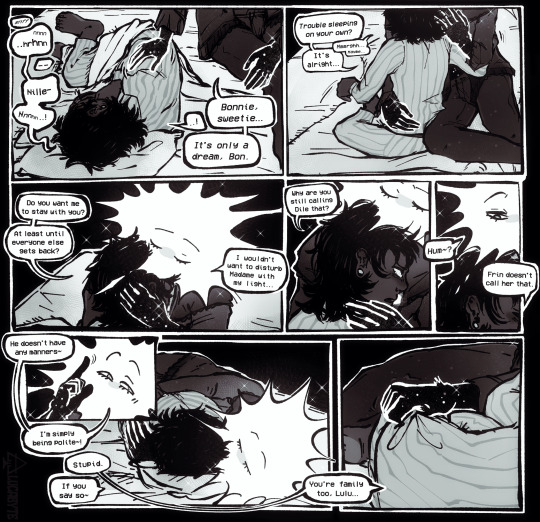
Different standards
#didnt mean to do this one in quote unquote colour but it wasnt legible without it so. heres a treat i suppose#isat#isat spoilers#in stars and time#in stars and time fanart#isat fanart#isat loop#isat bonnie#lucabyteart#coughs up a lung. anyway. ramble time as per usual. this is what i was warming up for btw in case it wasnt obvious#besides being another entry in the 'letting bonnie read loop for filth on accident' series. this is mostly self indulgent musings on#headcanons (and i will just use that word here.) ive previously rambled about in other tags and posts#namely: in the scenario that loop integrates into the party as a New Person for quite a while before The Truth Come Out. i feel they have#a decent chance at really scoring a slam dunk in becoming a guardian figure for bonnie? loop's demeanor is already colder and a tiny#bit more level-headed than siffrin's in the way they seem to discuss bonnie with them. namely pointing out that bonnie#never really hated them. it seems to be one thing they're genuinely at peace with? they've seen by now the truth that bonnie#was just scared and upset. and likely now knows that what bonnie wants is to be treated with grown-up respect within reason. plus loop#already scores bonus points with bonnie since they didnt 1. fuck up bad like sif did in act 5 and 2. saved sif in the party's eyes#... but then when it turns out that this clean-slate relationship with a stranger was siffrin being deceitful? must have been odd.#bonnie seems to really dislike being lied to. the question is whether they'd see it that way? would they feel betrayed there?#anyway. this is set after all those emotions are at least settled some. loop able to be more physically affectionate... and yet#still not letting themselves be quite as close as they'd like perhaps. perhaps...#anyway translucent pyjamas because i dont care if you're comforting a crying child you've GOT to SERVE!!!#and also i feel like the party probably wouldn't let loop stay completely naked for that long. especially not post-reveal anyway
1K notes
·
View notes
Text
Instead of writing a fanfic like a normal person this oneshot turned into two separate, contextless things,
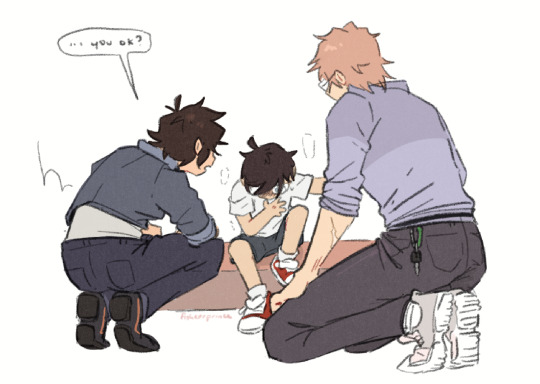
#sorry it’s how my brain works (sometimes can only see things in terms of tv scene-)#tumblr exclusive video fancy…#dcmk#my art#(quietly coughing and spluttering) OK alright I can feel the creative brain explosion slowing down. geez#coughs.#nyways. weird that there hasn’t really been a main case where poison is involved in a certain way#If I watch my own scribbled boards for too long im gonna get too embarrassed to post. Send post#Subarus hair is still infuriating by the way like take that off your normal hair is easier. The beanie is easier#you like Have to have the side corners on this haircut or it doesn’t look right#anyways. shiho ptsd moments I think she kind of gets irritated that shinichi doesn’t react the same so when he does she gets like#weirded out and vindicated and a little protective. Like woah wait. Love that you understand me rn don’t like that you feel bad I am going…#to…………. ssssssssssit here about it…………………………….. uhhhh. do you want. a rubix cube to get your mind off it#I don’t want to talk about my feelings I just want you to get it. you don’t wanna talk about your feelings either which is……………. Hmmmmmm#I like her. love of my life miyano shiho#masumi sera#conan edogawa#ai haibara#akai shuichi#let conan swear. HE SWEARS A LOT BUT LET HIM SWEAR IN ENGLISH I KNOW HE KNOWS THEM#man needs his emotional support akai family they like him#rigorous trials to being approved by the akai matriarch but everyone else likes him already and have already picked him up multiple times#and shuichi would let him swear
496 notes
·
View notes
Note
Firefox-official vs electronicmail
Hydrogen bomb vs coughing baby
okay come up with a better idea then. firefox-official is gone asshole it’s electronicmail or nothing
#this one was hard to respond to because it elicited the usual anon rage in me#but i had to think about it anyway.#this blog has been around for less than a month and it is driving me fucking crazy#don’t you think i know?#dont you think it hurts enough already#i dont want this blog either i want my old blog back with all my stuff on it#i would like to stick around#because i loved posting#and i get that you’re just having fun#but i’m making an example of you#less than a month vs five years#‘household name’ firefox official#spent five years building that thing#and now it’s just this.#i keep forgetting#and then i’m here again#not home#i know you all feel bad enough for me already#but it’s so hard to be myself because the environment on here is SO different#we were HAPPY#WE WERE SO HAPPY#Umm… Or whatever.#guess i could go back to firefox unofficial#but that feels far too close to the sun. and i’m done with the wings i think.#i dont mean to be so serious#a total mood killer i know#i just dont know how to proceed exactly#because when i post like normal i cant help but feel sad#and when i post about being sad its just sort of obnoxious#i’m not really asking for pity i just want to explain where i am at
510 notes
·
View notes
Text

hello HI GUYS. some doodles for you all yis eheh
(close ups below <3)
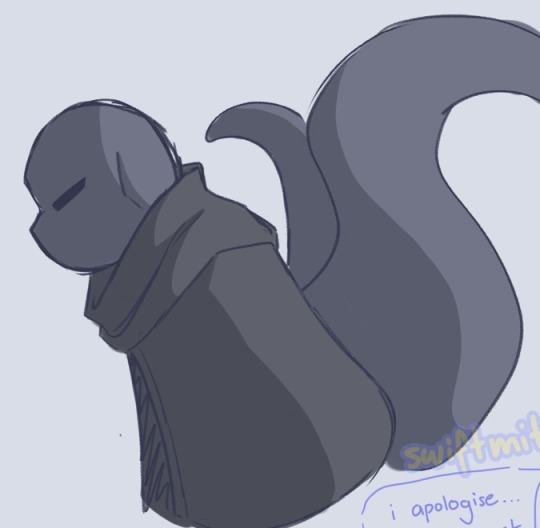
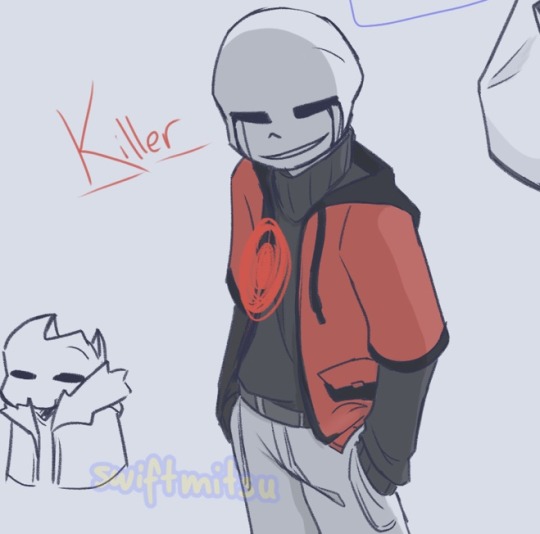
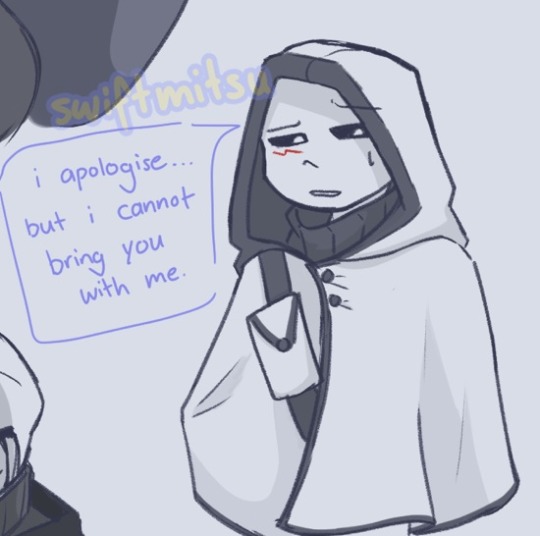
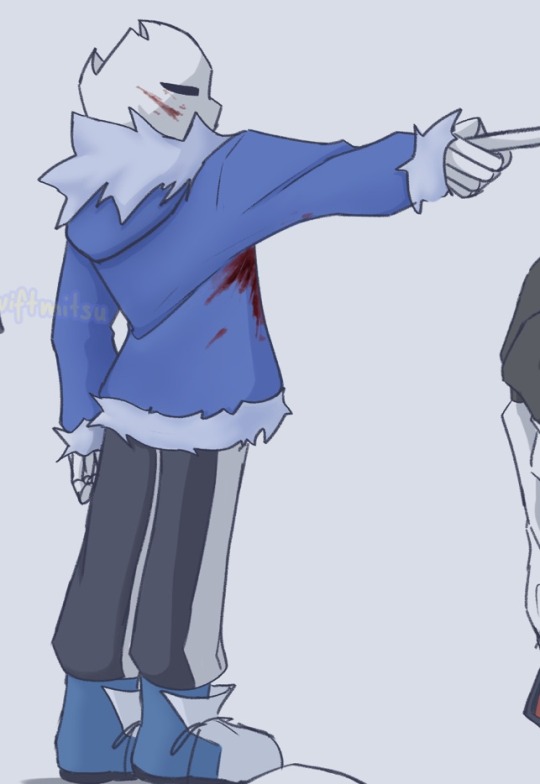
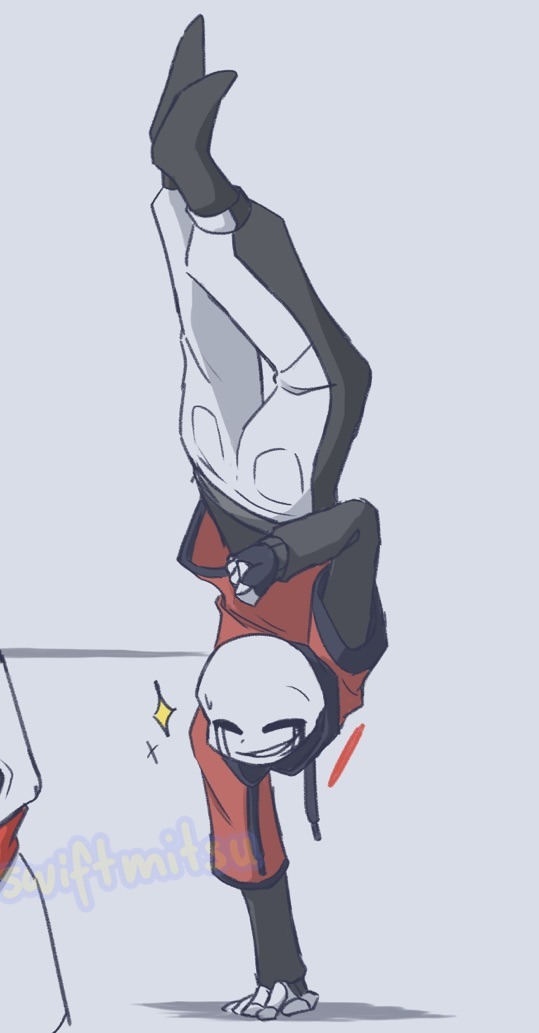
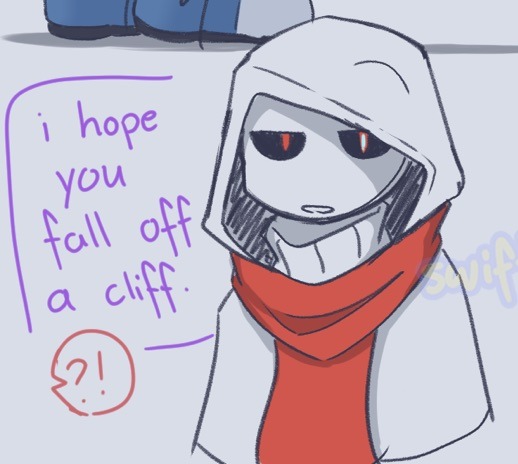
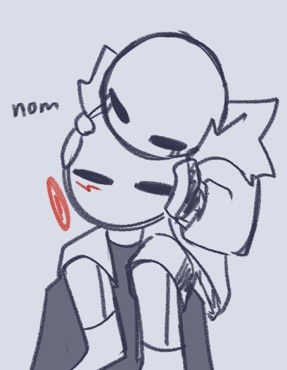
#mitsusart#undertale au#au undertale#sans undertale#undertale#sans#art#undertale fandom#undertale au fanart#utmv#cross sans#killer sans#dust sans#dream sans#nightmare sans#horror sans#murder sans#bad sanses#murder time trio#dreamtale#undertale multiverse#sans au#so like#im still animating </3333#that’s why things have been slow </33333#(also a bunch of other bs sob</33333)#(also let’s just say i’m putting in way more effort into the animation than i should HEKDJKD)#(BUT let’s also say i’m genuinely really liking how it’s turning out hehehe)#anyway enjoy these doodles<33#i have no idea where it came from. but Wanderer Cross.
791 notes
·
View notes
Note
hope you feel better soon!

I am riddled with ailments, but I stay silly!
#ask#non mdzs#My health journey has been: Hernia -> acid reflux -> Vocal pain due to aforementioned reflux -> chest infection.#I'm terrified to know what's about to hit me next. Please let it be something kind. PLEASE.#The consequence of living with linguists is that you'll wake up with a wacked up voice -#suddenly you're sitting you down in front of a program called something like Praat having your shimmer and jitter levels calibrated.#They gave me a GRBAS of 33012. I have a fun thing called a pitch break where a whole octave just does not exist.#My vocal pain was bad enough I ended up seeing a speech pathologist and that whole experience was super neat!#I learnt a lot about voice - to be honest I might make a little comic on it after some more research. Fascinating stuff.#For example; your mental perception of our voice modulates the muscles of the vocal folds and larynx.#meaning that when you do have changes (inflammation = more mass = lower frequency)#your brain automatically attempts to correct it to what it 'should sound like'. Leading to a lot more vocal strain and damage!#And it gets really interesting for trans voice care as well - because the mental perception of one's voice isn't based on an existing sampl#So a good chunk of trans voice training is also done with the idea of finding one's voice and retraining the brain to accept it. Neat!#Parkinsonial Voice also has this perception to musculature link! The perception is that they are talking at a loud/normal volume#but the actual voice is quite breathy and weak. So vocal training works on practicing putting more effort into the voice#and retraining the brain to accept the 'loud' voice as 'normal'.#Isn't the human body fascinating?#Anyhow; Now I have vocal exercises and strategies to reduce strain and promote healing.#Which is a lot better than my previous strategy of yelling AAAH in my car until my 'voice smoothed out'.#You can imagine the horror on the speech path's face. I am an informed creature now.#I'm my own little lab rat now. I love learning and researching. Welcome to my tag lab. Class is dismissed.#I'll be back later with a few more answered asks </3 despite everything I'm still going to work and I need the extra sleep.#Thank you for the well wishes! And if you read all of that info dump; thank you for that as well!
438 notes
·
View notes
Text
Y'all, I hate to say it, but no, Nandermo did not "go canon", in an "alternate universe" or through "implications" or otherwise. They were making fun of us. That was the point of all the little nudges and open questions that were quickly squashed. That was the point of the hypnosis ending. The point of that hypnosis was quite literally "Here, let's give the perfect fake wish-fulfillment ending to parts of our fanbase" (which is why there were three. They're fake. That's the point. The point is that they are supposed to be fantasies to appeal to people's hopes for the show).
Having Nandor and Guillermo as a classic sitcom couple set to a laugh track in a universe where none of the other characters exist was a jab at shippers who wanted Nandermo to be canon and cared more about that than the other characters or the premise of the show. They were making fun of "and they lived happily ever after" type fanwork. They were making fun of people who, in their eyes, ignored the irreverence and violence and black comedy of the show in order to make fluffy slash content. They were explicitly saying: "This is how we see you, and this is how we see what you want from this show, and we are telling you that it won't happen and we in fact have contempt for the very concept."
Why do you think they kept baiting the ship until the literal last lines of the show? They were making fun of us. They were saying "Ha! You still thought this would happen? After years of us saying it won't, to your face? Idiots." It's a comedy show, and they were making shippers the butt of the joke. They've been doing it for seasons now.
This is literally what Supernatural did back in the day. And nobody said that they made Destiel canon when they had an in-universe/alternate-universe stage play where the actors "explore Destiel". Fans back then recognized that it was a joke at their expense. That's what this is. Same as what happened in BBC Sherlock that one time, where in-universe conspiracy theorists said that Sherlock was in love with Moriarty (a ship the creators deliberately baited, mind you, same as they have here), specifically for the purpose of laughing at and making fun of that theory.
I'm so sorry, guys. I know you wanted to hope. I know you wanted to believe that the things the writers said at that con weren't true, but they were. I know because I wanted to hope too, even when I knew full well it wouldn't happen. They've been plain about how they feel about the ship for years. They saw it as a joke, one that drew in viewers, but was objectionable at its core. And they've followed through on that by baiting and jabbing up until the very end.
#WWDITS#WWDITS spoilers#Wwdits finale#Wwdits s6#Wwdits critical#Nandermo#At this point im glad to be done with this fucking show. Its been declining in quality for YEARS#Its treatment of women especially has been getting really bad#And the jokes have gone so stale#All things that they acknowledge with their characteristic ``lol that was the point`` attitude in the finale#I never ever ever want to watch a show just for the promise of a ship ever again. This has been a waste of my damn time#I wasnt even going to watch season six. I just wanted to know if they would actually go canon in the finale#And what do i get for my time and energy? Made fun of#Really living up to your name as The New Superwholock. Thanks WWDITS for a good first 3-4 years. I will treasure those
370 notes
·
View notes
Text
Blood Blossom Au: Baby's First Commissioner Meeting :)
TL:DR This Post: Danny (orphan) gets poisoned with blood blossom extract by Vlad. He runs away from him and ends up under the care of one Pre-Robin Battinson Batman! Starry is loudly pushing her batdad agenda.
(Also known as "Late At Night, When The Nightingale Sings" on my ao3!)
This was a fun rough idea I've been sitting on for weeks, thinking about how Commissioner Gordon and Nightingale's first meeting might go.
---------------
Commissioner Gordon likes to think that he's adjusting to the new normal of Gotham very well, -- the new normal being grown men running around dressed like bats, in military-grade strength body armor, committing acts of vigilantism, -- and slowly, little by little, he was no longer being surprised when this new normal pops up out of the shadows like the world's most terrifying daisy. His shaving lifespan thanks him for it.
....
The kid is a surprise though.
Granted, he seemed to be a surprise to the Bat too.
There's been a string of murders lately, -- which, in Gotham, is kind of like saying there's been another storm during monsoon season. And there's just been another; in some dilapidated building down in south Gotham, with the broken, boarded-up windows and mildew-crawling walls to match. The victim is a man in his thirties, multiple gunshot wounds to the chest, left in the center of the room for the blood to pool out around him.
The place is already secured when he arrives, the building swarmed with officers and the forensic detectives. The Bat emerges shortly after he does -- or, he might've been here the whole time, hiding someplace dark and shadowy. For his own sanity, Gordon doesn't think about it too hard.
The kid is a surprise, and he appears like a bolt of lightning.
He shows up in the middle of a conversation Gordon is having with the Bat.
A whistle, sharp and loud, slicing through the air, meant for open air rather than a confined space. Gordon's ears pierce and protest the sound, and the solemn, murmured chatter floating through the room abruptly cuts off like the swing of a gavel. As he turns towards the sound -- as they all do -- he swears, up and down, that he sees Batman's shoulders jump, just slightly.
At the source, perched on the window, is a boy. A boy in a gray-blue scarf and an oversized black hoodie, one that hangs off his frame and has ace bandages wrapped around the wrists in some attempt to cinch the sleeves. The hood is up, big like the rest of it, and threatens to swallow the upper half of the boy's face whole in the fabric. What upper half Gordon can see, is smeared with some kind of opaque, black face paint. He's holding onto the side of the frame with one hand, on his hip is a grappling hook. A familiar grappling hook.
Gordon has multiple questions, and his officers tense up.
Martinez puffs up, brows furrowing as his face shapes into a frown. Shoulders rolling back. "You can't be here, kid--"
The reaction is immediate, like a spark to gunpowder, the boy yanks his fingers from his mouth and his mouth twists into a scowl. Head snapping over to Officer Martinez, his hood manages to stay on but Gordon swears that as he bares his teeth, the glint makes them look sharper than they should be. His voice is rasp and quiet and harsh; snappish in its hissing; "Put a fuckin sock in it, Martinez. I'm not stayin."
Martinez reels back, and the boy immediately veers his attention off him. Like a switch, his demeanor drops. Despite half his face being covered, his mouth twists into a cringing, apologetic smile. Slanted and off-beat, embarrassed. It'd be disarming if this wasn't Gotham, and if he didn't just hiss at Martinez like he was about to bite his head off.
"Sorry." He whispers, voice deceptively polite and softer now. Gordon has to strain his ears to hear him. "I was looking for him."
He points his finger towards-- Gordon? No, Gordon follows the direction, and finds himself looking at -- the Bat.
The Bat, who always looks stiff as a pole, now looks even stiffer. Somehow. Well, the explains the grappling hook attached to the boy's waist.
"What are you doing here?" The Bat says, gruff and unable to completely smother the stumble of surprise in his tone.
The boy still holds a sheepish smile, and slips off the window ledge. His feet hit the creaky boards with a near-silent thud, the Batman finds his feet and rapidly begins crossing the room.
Gordon notes the slight tremble in the boy's legs as he straightens. He adjusts his scarf, which droops close to his knees now that he's standing, and slings a backpack -- how long has had that? -- off his shoulders. When the Bat reaches his side, he does as he always does, and looms over the boy like a spectre. A threatening mass of shadows cloaked in all-consuming black. Standing next to him, the boy looks teeny in comparison.
The Bat is a man who terrifies even the most hardened criminals, Gordon has seen grown men shiver in fear at the mention of his name. And yet when the boy looks up at him, he doesn't even flinch.
Instead, his sheepish smile melts away like ice under the sun, holding only traces of his previous embarrassment. It remains as a shadow on his face, a small upturn at the corners of his mouth. The boy pushes his hood back just enough to reveal glinting, ice-flint eyes surrounded in tar-black face paint. He holds the backpack up with one arm. "You forgot this."
#I have never seen Batman (2022) so really I'm just using battinson and crew as templates for my fic. but hey what else is new lol#dpxdc#danny fenton is not the ghost king#dp x dc#dpxdc crossover#dp x dc crossover#dpxdc fic#dpxdc au#dp x dc au#dpxdc fanfic#i dont know shit about detective work or true crime so forgive me for any bad terminology or incorrect procedure for how these things work#just a fun rough idea for how i imagined gordon's first meeting with nightingale goes LMAO. im sticking to the idea that danny doesn't#officially join the field for a *while* due to more than just health reasons. so his first appearances are brief and usually to give B smth#danny: im only here as express delivery for vader's little brother over there. yall stay safe tho.#bruce: *kill bill sirens bass-boosted* ohmygodwhatishedoinghere#batman: how did you get here... | danny: you have so many spare grappling hooks it was pr easy to just grab one and go#also danny is whispering on purpose because he doesn't have his ghost form to fall back on as a secret identity. so he *is* actually taking#extra steps to keep his identity safe. and people usually sound different when they're whispering. he also has personal beef with#office martinez despite the fact that they've never met. Danny's HEARD of his ass. he hATES his ass.#Martinez: *to batman* freak | danny: im going to Bite Him. | batman (reluctantly): hmr. please don't. | danny: im going for his shins#Martinez and Nightingale have this whole thing going on between the two of them. danny WILL slap a sticky note on Martinez's back that says#'asshole' on it and its the one spot square on his spine that martinez can't reach.#someone: why are you beefing with like. an actual 12 year old | martinez: HE'S A LITTLE RAT. THAT'S WHY. he's here to torment me#battinson: *did you grapple the whole way here* | danny: yah. it was kinda fun. i would've gotten here faster but i kept having to stop#battinson: *hnnn* im driving you back | danny:.. are you sure? | battinson already pulling him out of the room: y e s#i've been thinking about this for literally WEEKS. what did bruce forget? good question! i'll figure that out if or when i get to this#danny has Issues behind the word freak so its like a mini beserker button for him regardless of who the word is aimed at lol. lmao#martinez calls batman a freak once while nightingale is within range and its just the doom ost as danny simply Disappears from sight#like oops. you are now. In Danger. rip couldn't be me.#blood blossom au
454 notes
·
View notes
Text
Transcript:
Machine, I just got back from therapy.
I accept I am not papa's special boy, but I'm still going to kill you.
Audio source
#gabriel ultrakill#ultrakill#authors note: we are not *so* back. but posting should be happening again?#but the almost daily posting will never come back#sorry for disappearing. nothing bad happened i just did not have the chance to post anything#part of the absence was cause i was out of state#and i now have someone sitting behind me most of the time at work#so i can only edit when there is no one behind me and i happen to have no work to do#also the whole uh not really getting new clips thing. i mean there have been a few. but things will run out if i kept posting daily#so it will be slow
460 notes
·
View notes
Text
Actual Ultimate Classpecting Guide
For real this time.
Buckle up, this is a really long one. For everything that's posited, I can provide textual evidence; that being said, I'm not going to be including the textual evidence within the essay itself, because it's already long enough as-is. As such, please feel free to ask for clarification or sources on any assertion, and I'll do my best to provide.
Before we begin, there's some things to discuss about how we're going to be approaching classpect in the following essay. In numbered list form for our short attention spans:
1. There is a concept Hussie talks about multiple times in his book commentary, "personality alchemy" - the idea that there are these "platonic ideals" of certain characters, which can be mixed and matched with others, in order to create new characters. The examples he gives are of how Eridan was a proto-Caliborn, how Kanaya has shades of Jade, how Nepeta was a proto-Calliope, and how Sollux and Eridan have shades of Dave in them. Classpecting is fundamentally a form of this personality alchemy:
2. Class describes the character's arc and emotional hurdles, while Aspect describes the character's base personality traits by which this arc is experienced.
3. For example, all three Seers struggle with hubris: Rose's need to be the smartest person in the room led to her being manipulated by Doc Scratch, Terezi's obsession with meting justice led to her engineering a situation where the only option was to kill Vriska, and Kankri's desire to be seen as a spiritual leader amongst his friends led to him furthering their divisions and harming them.
Then, when their pride is shattered, they cope by inflicting willful self-blindness: Rose turns to drinking herself stupid (the opposite of Light's sway over knowledge), Terezi gets down with the clown (the opposite of meting out Mind's justice, as it's a Gamzee W), Kankri goes celibate (Blood L) despite his clear romantic feelings for certain teammates.
4. As for Aspect: note how all three Life players share the personality traits of optimism, stubbornness, and obstinacy. All three Breath players share an immaturity and naïvety, and are quite frankly irresistible to people for some reason. All three Light players share a need for the spotlight and a tendency toward long-windedness and persnicketiness. So on and so forth.
What's interesting is, if you start analyzing characters that share Classes and Aspects, these specific types of similarity crop up over and over - all our Knights struggle with insecurities and facades, both our Bards have a crisis of faith. All three Breath players have an aspect of immaturity and childishness to their characters, and all three Light players are deeply concerned with appearing intelligent and feeling important.
5. As a result, this guide is NOT intended for classpecting real life people, because we are complicated, we contain multitudes, and we don't have arcs. This is primarily an analysis of what Class and Aspect mean in Homestuck based on textual evidence, because I genuinely believe that you can basically figure it out if you read carefully.
6. Duality, and the idea of "equal and opposite," are major themes within Homestuck - Prospit and Derse, Skaia (described as a crucible of birth and creativity) and the Furthest Ring (the literal afterlife). Which classes are involved in an Active/Passive split, and opposing Aspects, are the same way. This is the primary method I used to determine the Active/Passive pairings and opposing Aspects. After all, as Callie describes, both Thieves and Rogues are classes "who steal" - so, too, do I try to unify Classes by a common theme, even if they diverge wildly in how that theme is expressed (as Thieves and Rogues do). In the same way as the opposite of "up" is not "apple," but "down", because "up" and "down" are both fundamentally concerned with relative vertical position, so too can be defined concepts like Breath and Blood, Hope and Rage, Light and Void - as well as the reasoning behind Class pairings like Heir and Page, Maid and Knight, and Seer and Mage.
7. Descriptions for both Class and Aspect are left deliberately vague and up to interpretation within the comic itself, and this is by design: the actual manifestations of an Aspect can vary wildly given the Class, and even individual person, that it's tied to. Calliope even makes note of the fact that, under the right circumstances, someone can manifest effects that appear to be the opposite of their aspect. She's also careful to couch her language in "may" and "can" - because these concepts are intentionally somewhat nebulous and malleable. As such, while this guide certainly lays down what can be gleaned and inferred from the text, do note that Homestuck runs on a soft magic system, and as such, nothing stated is firm, 100%, must-always-be-this-way - just an overview of what we've seen.
8. There is often great overlap between Aspects, Classes, and Classpects - which Calliope herself notes. Heart and Blood are one of the most salient, as they both have a fixation on relationships, and Calliope mentions that under the right circumstances, a Classpect may even be able to manifest what appears to be the opposite of their Aspect. Again, Homestuck operates on a soft magic system, so this is a feature, not a bug.
ASPECT
There's a little less to say about Aspect, not because it's less complicated, but because "base personality traits" are much more nebulous compared to Class's sway over character arc. Still, Aspect represents the fundamental way a character is, and thus, color every interaction that character has. There's a reason Ultimate Selfhood is sought through Aspect, not Class - Aspect is the core of the character's being, what makes that person that person.
That all being said, Class has major sway over how an Aspect manifests, and certain classes can even invert the Aspect and even the character's role in the party. As such, these descriptions must be parsed carefully in relation to Class. Moreover, due to the soft magic system, there is at times overlap between unrelated Aspects, which can also be exacerbated by Class - Heart and Blood being the most obvious in this regard. Still, overall, you'll find the Aspects to be fairly distinct from one another.
Please also note that every Aspect can deal with its literal counterpart by default - Light players can wield lasers, Breath players can wield the breeze, et cetera. Because this kind of goes without saying, and because the non-literal stuff is more interesting to discuss, I'm not really going to go into too much detail about the literal qualities.
Finally, something interesting to note is that nearly every Aspect follows its own Hero's Journey cycle - full actualization for each one usually means reaching around to its opposite Aspect, and taking lessons from them - for example, Breath players need to learn maturity and responsibility, while Blood players need to learn relaxation and whimsy. Thus, an Aspect at its worst manifests in two ways - either a toxic overabundance of the Aspect's worst traits, or such a dearth of the aspect that it begins to resemble its opposite. Only by reaching into the opposite, however, can the player be tempered and reach full maturity - can they become more of who they are.
SPACE / TIME
Space and Time are both concerned with physical reality, goals, and the way one approaches them.
Space is associated with "the big picture" - with recycling, reproduction, and the interconnectivity of all things. The aspect also presides over the enjoyment of the journey over the destination - Space players serve as reminders that the present moment is as important as the end goal. Space is often a more passive Aspect, being the stage upon which the story is set. They're the hosts of the party, and the one who marks the ending.
Its players reflect these tendencies, often being feminine, with penchants for life-giving acts such as gardening. Their personalities tend towards frivolity and silliness, finding it difficult to stay on-topic or bring full gravitas to serious situations. Perhaps a better word would be "distractable;" when the aspect is so concerned with all things in connection with each other, it's easy to lose track of details, and it's easy to enjoy things simply as they come. Space players tend to be kind, patient, and forgiving, which is a strength as much as it is a flaw; it's easy for malicious actors to take advantage of this compassion, or for the Space player to find themselves in a poor situation by being overly permissive. They can easily be painted over by stronger personalities, and tend to struggle with romantic relationships, as they attract many with their kind and giving natures, and few are naturally so considerate of the Space player in turn.
"Passive" is a good word to use; at a toxic overabundance of their Aspect, Space players are trampled underfoot. They become enablers, servants to dark forces, or so lost in their own worlds that they neglect the one they live in. With their Aspect "inverted," a Space player becomes a demon of poor prioritization. Distracting not just themselves from their true purpose, but others, too, the Space player will wreak havoc by overemphasizing unimportant topics and ignoring important tasks. This superficially resembles Time, in that the Space player will become fanatically dedicated to their task, but note that the poor prioritization is still Space-esque at its core.
Still, within this nadir is a valuable lesson: the strength of self-assertion, and the determination to see a goal through. These will allow the Space player to weed their garden, separating good from bad, allowing it to flourish like never before.
Time, in contrast, is associated with "the little things" - with details, minutiae, and processes. Time presides over the struggle toward something greater, the endurance of hardship with an eye on the prize - the destination over the journey. Time players are the ones keeping track of the tasklist, marking off each item as it reaches completion; they are the tireless workers keeping the whole engine running.
Time players, thus, are ones whose lives are marked by struggle. They are highly goal-oriented; in contrast to how Space players can easily move from goal to goal, task to task, Time players feel bound to see things through to the end, finding satisfaction only when they've achieved their desired result - and only until they come across the next goal in their journey. A Time player isn't happy without a goal to work towards, a craft to polish, a prize to win - but this driven nature can easily be its own downfall, as it leaves little room for the player to admit to their own shortcomings, or ask for help from others. Moreover, their focus on minutiae can leave them blinded to the bigger picture, and it's easy for a time player to fall to despair, able to do nothing more but spin their wheels. They're prone to directionless anguish, frustration, and resentment towards the seeming futility of their actions, becoming destructive and defiant even when it doesn't serve them to do so.
At a toxic overabundance of their Aspect, Time players become explosively destructive. The ultimate "goal" of all things is death, with which Time is associated, and accordingly, Time players have a penchant for aligning themselves with futility and entropy, struggling so hard that their thrashing leaves a trail of annihilation in their wake. With their Aspect "inverted," Time players detach entirely - they can become so fed up with struggle that they simply opt to lay their weapons down and let the end take them. It's very easy for them to come to the conclusions that either everything matters, or nothing matters. This superficially resembles Space and its big picture thinking, but note that its framework of struggle, and whether or not a goal needs to be pursued, makes it a Time concern.
But the inherent meaninglessness of existence is, in itself, an important realization to make - that whether or not anything "matters" in the grand scheme, things can still be worth doing, worth caring about, and worth investing in. This realization allows the Time player to attack their goals with renewed vigor and greater clarity, which in turn means that the party becomes an efficient, well-oiled machine.
BREATH / BLOOD
Breath and Blood are both concerned with directionality, interpersonal relationships, and autonomy.
Breath is the Aspect governing freedom, liberty, and independence; it is a force that breaks shackles, clears out social norms, and refutes "the rules," whatever those rules may be. Breath players can't be tied down, whether by physical bonds, societal rules, or even the ineffable forces of the narrative itself. They are leaders of example, pioneers, and trailblazers, opening new paths for their teammates to follow.
Breath players are goofy and gullible, often with hearts full of childlike whimsy, naivety, and even immaturity. They are friendly and well-meaning, fond of simpler things, and easily swayed by others. They approach the world with a sincere and innocent good-naturedness, like a baby animal before it learns to be fearful of danger. Something about this sincerity seems to make Breath players irresistible to others, and they often find themselves the subject of romantic attraction. However, in this childishness is also the great pitfall of many Breath players - their natures are naturally conflict-averse, and egotistical the way a child can be, failing to see beyond themselves. They can be incredibly callous when not considering the consequences of their actions, or the viewpoints of others.
At their worst, Breath players are irresponsible and callous. They'll shirk the consequences of their actions, blaming anybody but themselves, or simply choose not to care who they hurt in order to get what they want. They may even choose to stop making choices for themselves, leading to the "inversion" of their Aspect - a voluntary loss of freedom and independence, derived from an Breath-like aversion to responsibility, which superficially resembles the bondage of Blood.
But if they are able to overcome these tendencies, a Breath player will learn what true responsibility looks like - responsibility for themselves, their choices, and the effect they have on others. Armed with this, a Breath player's ability to break bonds can be focused into a clear force for good, clearing away all obstacles and harmful societal standards, leading the charge into something new and beautiful.
Blood, in sharp contrast, is the aspect that governs bondage, contracts, and interdependence. It is a force that binds. Under Blood's sway are not only romantic entanglements, but familial, friendly, and societal ones as well. This aspect sees overlap with Heart, but the division is this: Heart concerns itself with feelings, and Blood concerns itself with compatibility. Blood players are diplomats, forces that remind us all that we are more similar than we are different, and that that similarity should bring us together when we are on the verge of pulling apart.
Blood players, reflective of their Aspect's association with bonds, tend to be neurotic and obsessive. They have a tendency to over-examine and overthink, constantly fretting over the infinite and infinitesimal variables that influence the shape of society and interpersonal relationships. However, this judgmental nature stems from a deep well of idealism and empathy; Blood players can't help but care about others and wish for the best for them. In a way, this makes them one of the most mature members of the team, being concerned with its overall well-being. Unfortunately, their prowess does not extend inwards, and their assessment of themselves is usually direly incorrect - all the worse because Blood players always feel responsible for those around them. Blood, being the Aspect concerned with interdependence, is the weakest one when all alone.
Thus, it's easy for the Blood player to wind up controlling - desperate to make sure everyone is moving according to their vision, they'll become iron-fisted dictators, with a "my way or the highway" approach to social interactions. It's easy for them to wind up pariahs of their own making, becoming so critical of others, or so adamant about enforcing their own will, that they inadvertantly sever their ties - something that superficially resembles Breath's independence, but is truly a result of Blood's neuroticism.
But with that space and separation can come great clarity. Blood players must learn to relax their grip, and allow people room to breathe - including themselves. Once able to grasp that sometimes bonds must be forged with a soft touch, Blood players' natural empathy shines through, allowing them to build something so much kinder and greater than the sum of its parts.
LIGHT / VOID
Light and Void are both concerned with knowledge, ontology, and "narrative relevance".
Light (as well as its counterpart) are perhaps best understood through the lens of "narrative" - this idea that, of all things that do and don't exist, and all events that do and don't happen, only the ones put to page are "relevant". Thus, Light is associated with knowledge and luck - that is to say, it's associated with the knowable, the objective, and the concrete, and the ability to determine "important" events. Light players have read the book they're participating in, and able to serve as luminary guides from one plot point to another, lighting the lampposts for others to follow.
Light players, naturally, are erudite and educated, possessing keen intellects and cunning minds. They are fond of knowledge itself, of markers of status and prestige - whether that's wealth, the adulation of the masses, or a massive library. They harbor a desire to be important, to be seen, to be acknowledged, and are happiest when they are looked up to. Conversely, they deal poorly with being looked down upon. Their confidence transmutes easily into hubris, and they struggle with having that pride challenged. As such, they tend to be volatile and unpredictable, quick to retaliate against those who threaten their egos, or obsequious to those whose acknowledgement they desire.
Their desire for the limelight can quickly spell disaster - they can become incredibly cruel, harsh, and egotistical in their pursuit of narrative significance. They forget, in their obsession, that they, too, are fallible and flawed, and the inevitable reminder can come very harshly. Light players struggle with moderation, and as such, when they feel shame, they'll often take drastic measures to cope with it - deliberately darkening their own influence or intellects, removing themselves from the "story" entirely - something which superficially resembles Void's penchant for the background, but which is firmly rooted in Light's obsessive need for drama.
But in experimenting with narrative insignificance, Light players can reach an epiphany - in their absence, others may shine, and that can be a wonderful thing. Light players, then, can learn to shine not just for their own sakes, but for the sake of others, allowing them to weave a story even more brilliant than any that can be weaved alone.
Void, in contrast, is the blank spaces between the words. That which is secret, subjective, unknowable - these are Void's domain. It's associated with taboos and hidden things, sexuality and pleasure. It's also associated with the empty canvas - the blank space before creation, and the oblivion to which creation is eventually destined for. Thus, it stands for infinite possibility, though the collapse of those possibilities into a reality removes that reality from Void's domain.
Thus are Void players ever cosigned to the background, though this generally suits them fine. Void players are very self-possessed. Where Light players tend to exaggerate and complicate, Void players are honest and simple, preferring straightforward solutions. They don't tend to think very hard, instead letting intuition and emotion guide them to where they want to be - which makes them one of the more stable personalities on a team. However, this simplistic, feelings-driven approach often leads to pleasure-seeking behavior, poor impulse control, and overindulgence in vice, and from there, to irrelevance, with which Void is so closely interlinked.
Void players are especially prone to vice, and at their worst, will become so drunk on pleasurable activities that they pursue them to the active detriment of the party's goals or the Void player's self-improvement - making them the ultimate irrelevant character. They can also very easily drag others into their mélange, with a forcefulness that resembles Light's illuminating guidance, but which is ultimately rooted in Void's pursuit of personal pleasure.
But there's a lesson to be learned in Light's domain: how to bring themselves into relevance and greatness. A Void player, once they learn to pursue not just personal pleasure, but a greater satisfaction for the collective whole, can drag the Void behind them, kicking and screaming, to where it'll be of use.
MIND / HEART
Mind and Heart are concerned with what it means to be a sentient being, with identity, and with why we do what we do.
Mind is the Aspect associated with logic, rationality, karma, ethics, and justice. To a Mind player, they "are" because they "think". They are keenly aware of the consequences of every action, and well-versed in cognition and behavior, such to the point of manipulating others with ease. Deeply concerned with the "effect" of cause-and-effect, Mind players are always cognizant of debts and credits, where justice is owed and where it has been over-meted, and their subtle machinations culminate, like well-placed dominoes, in grand and explosive finales.
Mind players are schemers - it's in their nature. They have a tendency to view the world as a puzzle or game, with themselves and the people around them as pieces on a board, and set as their standard rules the laws of ethics and karma - owed debts and overhanging credit - guilty and innocent. Mind players are wickedly cunning, and have an high success rate with every scheme they commit themselves to, but the grand downfall of all these tendencies is that they tend to lack in a sense of identity, and have a poor grasp on their own emotions or desires. While they may know how to provoke a desired reaction, they don't know how to change someone's mind. They often find themselves grappling very painfully with their own selfhood, with feelings of emptiness, inadequacy, or uncertainty.
Thus, a Mind player at the worst zenith of their Aspect is heartless and cruel. Leaving no space for empathy or even personal feelings in their plans, the Mind player will plot for an ending as heartless as they are. But a Mind player is never truly without emotion, and ignoring their own feelings causes them to manifest in terrible ways - Mind players have a tendency to seek toxic, codependent relationships, hoping to find external validation, subjecting themselves to the wishes of others, which can appear like Heart's fixation on feelings and desire.
But in recognizing their own need for emotional validation, and the importance of their own feelings, a Mind player can realize that there's an entire dimension to the game they've been playing that they've been ignorant of. When a Mind player learns to temper their schemes with empathy, compassion, and kindness, how much more success they'll see - and how much happier that grand finale will be!
Heart, then, is associated with feelings, motivations, intuition, the soul, and the self. To a Heart player, they "are" because they "feel" like they are - and they're keenly aware of the multitudes that are contained within themselves. Deeply concerned with the "cause" of cause-and-effect, they're drawn to desires, those of themselves and of others, especially where strong feelings are concerned. Heart players are gifted with an intuitive understanding of those around them, both their good and bad qualities, and are tasked with the grand task of bringing out the best.
It stands to reason, then, that Heart players have a firm grasp on who they are and what they want. For the same reasons, it's difficult for a Heart player to truly hate or condemn another person, because they are so adept at understanding them. However, this understanding comes with a price - because the Heart player is so aware of themselves, they can't escape their own worst traits - nobody self-loathes as accurately as a Heart player can. Nor can they ever truly be untruthful with another, making them poor manipulators. Capable of presenting a different facet of themselves as the situation calls for it, certainly, but just as it's impossible to lie to a Heart player, who always knows how someone really feels, it's impossible for a Heart player to lie to themselves.
With this sincerity comes vulnerability. Heart players wear theirs on their sleeves, and at their worst, this can make them demanding, needy, and sensitive - so eager to connect with others emotionally that they'll cramp themselves to fit others' desires. But they can't ever keep this up for long; Heart players have a tendency to withdraw from others after being hurt too often, finding it easier to be alone and silent about their feelings than to deal with the pain of rejection. They may even work to manipulate others, preying on their emotions and desires to force them to act in their worst interests. This superficially resembles Mind's cold logic, but unlike Mind's cool rationality, Heart's aloofness is a mask, an attempt to avoid pain by pulling away.
But this isn't purely a negative, because a Heart player can learn a healthier form of detachment, and separate out healthy and helpful desires from harmful and detrimental ones. Given this clarity, the Heart player becomes the team's emotional core, able to raise up each teammate's best qualities, while helping them deal with their worst, enabling everyone to be the best possible version of themselves - which the Heart player knew them to be all along.
LIFE / DOOM
Life and Doom are concerned with outlook, with journeys, and with trials and tribulations.
Life is an aspect concerned with healing, growing, and improving. It is associated with beginnings, optimism, and positive emotions. The very essence of Life lies in its healing abilities, in this idea of overcoming the odds and triumphing over hardship and difficulty. Life is action, movement, and motion, and its players can scarcely hold still. Life will find a way - and Life players harbor the same immutable belief; they are the most stubborn weeds in the garden, the cockroach that survives the apocalypse, and the beating heart that refuses to stop.
Life players tend to be optimistic and confident. They are self-assured individuals, with a stubborn belief that good things are on their way, and any hardship they face is not only temporary, but something that can be overcome. They can find the silver lining in any cloud, and enjoy themselves under any circumstance. They love to nurture, to care for others, though this love has a tendency to be one-sided. Indeed, Life's stubborn nature is its players' greatest pitfall; their persistence easily becomes obstinacy, and their confidence can become condescension. Their self-assured nature easily becomes egotism, and they can have great difficulty grappling with those who don't share their views - even coming to oppose those who bring emotional pain and suffering that can't be easily fixed.
It's very easy for a Life player to decide another person isn't worth their attention, and opt to leave them behind - after all, Life has to move forward, no matter what it tramples in the process. At their worst, they're stubborn to the point of not listening to anyone but themselves, confidence becoming blockheadedness. This focus on forward progress without looking back can even cause Life players to become harmful to others, so focused they are on their own growth that they don't notice that they're choking everyone else out. This may resemble Doom's death in its worst case - arresting everything else, eventually blocking even their own path with unruly, out-of-control fecundity.
Thus, a Life player needs to learn to more gracefully accept Doom's influence - to pause, slow down, and consider viewpoints that are negative, unpleasant, or difficult. A Life player, endowed with moderation, will be able to cultivate a bountiful garden, rather than an unruly jungle - a place for all to flourish and live in plenty, never wanting for anything.
Doom, then, is the aspect concerned with death, with rest, and with endings. Doom is associated with suffering and with negative emotions, with peace, with sleep, and with dreams. Doom players have a natural penchant for prophecy, and are often dual dreamers, able to take advantage of both Skaia's oracular clouds and the Horrorterrors' voices over Derse. All things must eventually come to an end, and not all times will be good; in these troubling times, Doom players shine, as they are the guides who call the murk home, and know best how to navigate rough waters, course-correcting until the storm passes.
Doom players tend to be deeply pessimistic. They experience, to a much more magnified degree than others, negative feelings and impulses, and it's difficult for them to see the world without seeing its flaws, first and foremost. They are not healers, but commiserators, those who understand greatest that sometimes there's no way to deal with tragedy but to simply sit with it and wait for it to pass. The counterpoint to Life's insistence on breathless positivity, Doom is a reminder that pain, grief, sadness, shame, and guilt are not unnecessary things - in fact, excising them can lead to terrible consequences. Doom players are the universe's martyrs, often taking it upon themselves to course-correct, to sacrifice themselves in order to give others a chance to continue on, to avert a terrible fate.
Unfortunately, this tendency also brings with it a tendency for Doom players to wallow in misfortune, or worse, to take themselves out of the picture, giving up entirely on seeing a better ending. As if energized by their own sense of futility, a Doom player at the "inverse" of their aspect may seem to echo a Life player's focus on forward progress and motion, actively spurring their team on towards an untimely demise.
A Doom player must learn to harness this sense of progress for good, rather than harm. A Doom player, once able to grasp the joy of life even in the greatest depths of despair, will be able to fill even the darkest hours with peace, meaning, and hope.
HOPE / RAGE
Hope and Rage are concerned with permission, and are the lens by which we define reality.
Hope is described by Hussie in the book commentary as being "framed as the most powerful aspect" because it is, literally, an aspect that defines reality. Its specific ability is lies in reducing the "fakeness attribute" of something, thus making it "real". Hope is associated with convictions, with idealism, with faith, order, holiness, and, of course, with magic - which Hope turns real. Hope is permission itself - a reality-breaking ability to look at the world and decree that it must be another way, a way in which the Hope player believes it ought to be.
Thus, Hope players tend to be hard-headed zealots, with no self-awareness whatsoever. Their inclination towards powerful beliefs makes them very difficult to dissuade from a path they've set their minds to, and their specific suite of abilities makes them terrifyingly likely to make their vision come true. Hope players are usually not particularly cunning, nor particularly intelligent, nor even particularly empathetic. Given the Aspect's focus on conviction and faith, it's usually very difficult for Hope players to notice anything occurring beyond their own minds and feelings. Thus are Hope players hopeless optimists, hopeless romantics, and hopeless in general - often great sources of embarrassment to their teams, as their naked sincerity is painful to witness. However, their ability to define reality does not leave them when their beliefs are faulty (which they often are, given Hope players are not particularly introspective, either), which is what makes a Hope player so dangerous.
A Hope player can easily be set on the wrong path - as convicted as they are, and as difficult to shake from that conviction as they can be, Hope players can easily march down a path of destruction, if not persuaded with a deft touch and gentle guidance. In the event that their faith is broken, Hope players easily become despondent and lost, floundering and wishy-washy, which superficially resembles Rage's self-consciousness, but is truly just a lack of direction.
But Rage has a powerful lesson to teach Hope players - that of questioning themselves, interrogating their own beliefs. Once their convictions have gone through rigorous scrutiny, revised into the best, brightest versions of themselves they can be, a Hope player is a worker of miracles - speaking into existence a beautiful future on faith alone, proclaiming that how they see the world is how the world shall be.
Rage, then, is the power of denial. If Hope reduces the "fakness" of a thing, then Rage reduces its "realness". Rage, too, is a means of defining reality, in this case taking a torch to the aspects of reality that it rejects. In more passive Classes, this works in subtler ways, stoking others towards destructive fury. Rage is associated with anarchy, chaos, revolution, destruction, anger, and nihilism. A Rage player will not suffer a world that does not satisfy them, breaking it to pieces, such that something new can take its place.
Therefore, Rage players are prone to harboring anger and resentment, discontentment with the status quo, and faith only in that what currently exists must somehow be dismantled. However, unlike Hope players, who can't help but be pathetically sincere, Rage players are incredibly self-conscious, and often try to mask and hide their embitterment and anger. This, ironically, leads to further ostracization, as others can tell they're being inauthentic. This only further compounds their sense of alienation, and drives them further into smoldering resentment. This makes Rage players sound volatile and dangerous, and they are - but the same fury that moves them is the fury that ignites revolts and tears down oppressive regimes, a necessary and vital well of energy and momentum. It takes careful handling to ensure that the team's Rage player can channel this energy towards righteous causes, rather than marking all as a target for their destructive ire.
In the worst-case scenario, the Rage player turns that rage out indiscriminately, deciding that there is nothing worth fighting for - only unpleasant things to be brought to ruin. This is Rage at its toxic overabundance. Conversely, a Rage player can retreat so harshly into their mask that they allow others to dictate their beliefs, taking them to heart - an action motivated by Rage's destruction (this time, turned inwards) that superficially resembles Hope's convictions and faith.
The true path for a Rage player is a healthy balance - to allow themselves some of Hope's sincerity, and by doing so, to become more sincere and true. This will let them release the pressure of their mounting ire, such that it can be converted into productive, rather than destructive, energy - the heralds of a revolution, razing away the faulty, corrupt old systems such that something better and new can take their place.
CLASS
As previously stated, Class governs a character's character arc - the character's starting circumstances, whether their conflict is primarily internal or external, and what major aspect of their Aspect becomes a hurdle for them to overcome.
In the same way an Aspect's sways tie into the character's base personality, the character's Class abilities tie into the kinds of struggles they face, and have great influence on how their Aspects manifest.
That being said, a character - and their Class - are always subject to their Aspect, as their Aspect is tied fundamentally into who they are. Thus, it can be said that a Light player will always have an affinity for knowledge and provide Seer-esque guidance even when not in a Seer role, a Doom player will always have prophetic abilities even with a non-prophetic class (note that Mituna, an Heir, still had prophetic visions, despite those generally being the realm of Mages and Seers), and a Life player will always have a penchant for healing, even paired with a destructive Class like Prince or Thief (the Condesce, after all, could still extend life; a Prince of Life would likely manifest not as one who causes plants to wither and die (this would actually suit a Prince of Doom), but one who destroys in the way of nature overtaking an abandoned shack, or a forest breaking down a body).
This means that when a character's Classpect inverts their Aspect, it doesn't mean that they suddenly become a hero of the opposing Aspect - rather, it means that, at their very worst - at the nadirs of their character arcs - they will lean so much into their Aspect's worst traits that it will superficially appear as the opposite, when all it really is is an absence of themselves. Dave, a Time player, usually so attentive to detail (despite his disaffected facade, he's always paying rapt attention to Karkat's rants, and noticing all the clues pointing to his destiny of defeating LE), at his lowest emotional point (arguing with Grimbark Jade after sobbing about his lost childhood whimsy), states that he doesn't think Lord English is that big a deal, and never even did anything directly bad to him or his friends - when he was literally directly haunted by LE via Cal his entire childhood. Similarly, Rose drinks herself stupid in order to cope with her mother's death.
Note how, superficially, this almost appears to be an invocation of Space's "big picture thinking," its passivity and permissibility, or how Rose's case appears to be Void's tendency to indulge in vices and pleasure - but they're not. Time's worst traits superficially resemble Space, Light's resemble Void, and vice versa - Grimbark Jade is the Condesce's taskmaster, and Porrim at her worst was as much of a nag as Kankri, trying to do a Time player's managerial job. Horuss and Equius at their worst won't shut up and won't stop talking over their partners. So on and so forth.
Finally, Calliope tells us a couple things about Active/Passive pairings. The first is that Calliope introduces the idea of paired classes with the idea that both Rogues and Thieves "steal" (and later, that both Princes and Bards "destroy"). This presents the idea that both classes can be roughly summed up with the idea that every pairing can be summed up with a common theme.
The second is her description of what makes a Class Active versus Passive - that Active Classes move their Aspect to benefit themselves, whereas Passive Classes allow their Aspect to be moved in order for others to benefit. In a way, they're like active and passive voice in grammar (to tie in with the way Classes and Aspects are so tied to ideas of narrative and character arc) - an Active Class performs their Aspect, and a Passive Class allows the Aspect to be performed "by others" (the famous piece of advice regarding telling the two apart being that a sentence written in passive voice can have "by zombies" tacked to the end of it - eg, John is attacked "by zombies", as compared to active voice - John attacks).
Thus, the Class pairings, along with their basic themes, are as follows:
KNIGHT - / MAID +
"One who controls."
Knights and Maids are paired together through two key factors: the first is that they both hold leadership or managerial roles; the second is that both classes carry the connotation of serving a Lord. Fittingly, they are both struggle with the control of malicious forces - Knights with prophecies indicating their role as heroes, Maids with direct usurpation by malicious forces.
PAGE - / HEIR +
"One who inherits."
Pages and Heirs are paired together because they both fundamentally deal with the great inheritances placed before them. Pages can come into incredible, limitless power - but they must struggle and work hard for it; Heirs begin the game in societal comfort and wealth, and must learn to defect from their decadence.
THIEF - / ROGUE +
"One who steals."
Thieves and Rogues are highly adaptable, as Thieves are capable of fantastic on-the-fly adaptation, whereas Rogues have an infinite toolbox at their disposal. They are both provocateurs, shakers of the status quo, though the Thief does so for personal gain, while the Rogue does so to right injustice.
MAGE - / SEER +
"One who guides."
Mages and Seers are tied together by the gift of prophecy and future sight. Seers are privy to the endless branching paths that the future may take, while Mages are gifted with the ability to outright determine a future that will certainly happen, appearing to be prophecy.
WITCH - / SYLPH +
"One who changes."
Witches and Sylphs are individuals blessed with great magic, but poor judgement. Sylphs heal and nurture, but are drawn to those with strong desires, and enable them to cause great harm; Witches, meanwhile, possess strong emotions, which they often use as moral guidance, for better or worse.
PRINCE - / BARD +
"One who destroys."
Princes and Bards are representatives of society - the one who determines its course, and the one who recounts its passing. Princes suffer from a toxic overabundance of Aspect, and are prone to spectacular meltdowns, whereas Bards are always poised for a crisis of faith. Both are responsible for catastrophic failures - but also breathless victories.
INDIVIDUAL CLASSES
KNIGHT
"One who controls [Aspect] or controls using [Aspect]."
Knights are frontline warriors, rallying points behind which the party falls into line. Although they are often leaders, just as often, they are logistical planners, strategists, or simply the team's beating heart. They are almost always thrust into positions of narrative significance, often carrying grand destinies or even outright heroic prophecies on their shoulders. The are the party's rallying force, its center, and a guiding light - the one to lead the charge, behind which the party will follow.
The primary character struggle a Knight will have is with crippling insecurity. Knights are prone to self-loathing and imposter syndrome, and will often adopt a façade in direct opposition to their aspect (ie, their fundamental personality) in order to cope with their feelings of inadequacy. Thus, their relationship with their aspect becomes love/hate - though they're naturally drawn to their aspect, and even naturally skilled at utilizing it, they have a tendency to become their own worst enemy, as their insecurities make them push their façades, and their façades distance them from their aspect.
"Controlling their Aspect" means that the Knight has easy access to their Aspect, wielding it like a tool or weapon - for good or for ill; "controlling using their Aspect" is what grants Knights their leadership abilities, able to dictate how others ought to act in accordance with the Knight's Aspect - whether their understanding of their Aspect is high or low, whether their advice is good or bad.
Therefore, at their worst, a Knight will fall prey to their insecurities, retreating into their facades, rejecting their Aspect, which will allow disharmony or misuse of it to proliferate throughout the team. They may even wind up deliberately twisting their Aspect's presence within the team so that they never have to be confronted by it; these distortions ripple outwards and eventually culminate in major catastrophes, all on account of the Knight's negligence.
But at their best, a Knight is a shining beacon and guiding light; when they come to terms with themselves, and allow themselves to be comfortable in their own skin - when they no longer allow themselves to be ruled by their insecurities and anxieties - they ensure that their aspect is harmonious wherever it appears throughout their party, and can wield it expertly as a weapon, as if it were their own flesh and blood.
MAID
"One who allows control through [Aspect] or allows [Aspect] to be controlled."
Unlike Knights, which take positions of frontline prominence, a Maid is a managerial presence in the backlines, though no less crucial for the smooth functioning of a party. Just as the invisible hands of the hired help keep a household running, the Maid will be called upon to provide vital services to keep the game stable, even if those services are more noticeable by their absence than their presence. Maids are often the party's unsung heroes or even shadow leaders, tugging at invisible strings, fingers on the pulse.
A Maid's primary character struggle will be that of escaping oppression. Maids tend to start the game in positions of subjugation or subservience, especially to malicious forces, and their abilities often end up being exploited to serve their masters' ends. Therefore, one may even have the impression that a Maid is ruled by their aspect, held prisoner and slave - at least until they're able turn the tables.
"Allowing their Aspect to be controlled" means that Maids are capable of directly dispensing their aspect unto others - a Maid of Time can dispense time unto foes, pausing them in their tracks; a Maid of Life can grant so much life that they can revive the dead. Their boons are great and direct, straightforward in a similar manner to Knights. "Allowing control through their Aspect" grants them their uncanny managerial abilities, as their aspect dictates the realm in which nothing occurs without the Maid's knowledge or permission, a realm made available to whomever the Maid's allegiance lies with.
Thus, at their worst, the Maid becomes a saboteur. Exploited by malign forces, their abilities to allow control over others through their aspect, or control of their aspect, makes them perfect vehicles by which their aspect can be hijacked or usurped, and made to turn against the party, and they often find themselves placed into these positions through no fault of their own. It takes the party banding together to shake off the forces that would keep a Maid in bondage.
However, at their best, Maids ensure that the party can never go too far off the rails. There is a place for everything, and everything will be in its place; a Maid is a supply line, a safe haven, and a promise that everything will be neat and tidy when the party returns from war. When the Maid belongs to themselves, their homestead becomes a fortress, and nothing occurs under the Maid's watchful eye without their express permission.
PAGE
"One who works to inherit [Aspect] or inherits [Aspect] for themselves."
Pages are a class defined by promise. As the name suggests, a Page begins weak, but has the great potential to develop into one of the most powerful players in the game. The exact nature of a Page's powers are vague, not because they are insignificant, but because they are so great that it's difficult to encompass them all. At the apex of their arcs, Pages are capable of miraculous feats, overpowering even Lords and Muses - if only they could reach that point and stay there.
A Page begins the game weakest of all, reflective of their long journey of growth. Where most classes only fall into deficit of their Aspect at their lowest emotional points, Pages begin their arcs in deficit - exhibiting character traits opposite to those their Aspect normally encompasses. Moreso than any other class, a Page must learn to grow into their Aspect. Weak-willed, naive, and easily hurt, Pages require careful nurturing if they're to come into their own.
"Working to inherit their Aspect" describes the endless journey of growth the Page must undertake - one with many missteps, backslides, and setbacks along the way. Still, they "inherit their aspect," meaning that their full potential, when realized, is overwhelmingly great - practically becoming their Aspect in humanoid form, capable of utilizing it to its glorious full potential.
However, their nature defeats them, and even if they can attain this state, the Page usually can't stay there for long. At their very worst, the Page's deficit of their Aspect's better qualities can turn the Page into a gravitic well of misfortune - an albatross about the party's neck, the centerpoint, if not inciting incident, of a massive disaster, as their team is sucked in by the Page's natural weakness.
But this is only true as it contrasts to a Page at their best - having grappled and won with the greatest of all weakness, a Page is poised to come into the greatest of all strength. Shown kindness, compassion, and support, a Page at full power reflects a party at their best. A Page at full strength is breathtaking to behold, an unstoppable force of nature, their Aspect made manifest.
HEIR
"One whom [Aspect] grants inheritance or inherits [Aspect] for others."
Heirs, in contrast to Pages, start the game strong. They usually belong to the upper echelons of their respective societies, a position of great wealth, leisure, and comfort, and are set to be inheritors of even greater wealth. Similarly, their Aspect comes to them as if of its own will - it is powerful, but difficult for the Heir to control, reflecting the wealth and status they've enjoyed as birthright.
An Heir's main challenge is that of examining their privilege, and learning where they wish to spread the gift they've been given. Because of their positions of sheltered comfort, Heirs are not particularly world-wise, and often harbor massive blind spots to the suffering of others and the ills of society. As such, they tend to be fairly aimless, given great power but no strong motivations, and have a tendency to simply indulge in their Aspect without contributing great help or hindrance to their team at all.
The Heir's Aspect is practically an independent entity. Being one whom "their Aspect grants them inheritance" refers to how the Heir starts powerful, able to summon their Aspect to perform great, miraculous acts. However, it is highly intuitive and difficult to control. The Heir's challenge lies not in attaining great power, but in attaining control over, and the ability to direct, their existing abilities. Once they do, they can "inherit their Aspect for others" - Heirs become a conduit through which their party can experience their Aspect, making it a usable pool of wealth for them all to draw from. However, because of their comfortable positions, many Heirs end up dallying, finding no pressing need to do so.
But this dallying hides a ticking clock. An Heir's inheritance will come to them, one way or another, and if they aren't ready to receive the great responsibilities that come with such great power, then the power will eventually consume them. An Heir with no clear direction will eventually become lost to their Aspect, entirely removing both from play. Like how wealthy inheritors simply become part of the status quo, so, too, does an Heir disappear into their Aspect, fixing it in place.
Thus, Heirs must learn where they have been blind, where they have been foolish, and what it means to be underprivileged. Then, once they turn their energies towards addressing those injustices - to taking responsibility for building a better future - when their wealth comes to them, they'll be able to distribute it where it's needed most. An Heir, fully-realized, brings their Aspect to heel, and makes it a resource available to their entire team, as if welcoming them all into the family.
THIEF
"One who steals [Aspect] or steals using [Aspect]."
Thieves are, as the name suggests, greedy - much of their arc revolves around a desire to amass wealth, though what's considered "wealth" varies based on the Thief and especially their Aspect. They tend to be callous people by nature, capable of ignoring or trampling over the feelings of others in order to take what they want, in the hopes of filling an emotional void the Thief may not even be fully aware of.
The Thief's playstyle is one of careful resource management. Reflecting a natural tendency to take "wealth" from others, Thieves are unable to use their Aspect without first "stealing" it - a subtractive act which leaves the victim bereft of the Aspect, weakening them in the process. Because of the finicky nature of these abilities, it takes great cunning to be a Thief, and the Class both demands and requires the player to be adaptable, flexible, and quick on their feet, able to effect complicated schemes and engineer the perfect situations for their powers to have the greatest effect. Thieves aren't necessarily strong, but they have a very high victory ratio, because they're experts at turning a situation to their own advantage.
"Stealing their Aspect" refers to the fundamental way in which the Thief class is played, this resource management game; "stealing using their Aspect" reflects how the Thief often becomes a malignant force within the party, viewing their own teammates as caches of wealth to plunder. Thieves are naturally prone to hurting others for their own purposes, craving drama and attention, and being of such callous dispositions that they're able to perform extreme acts of cruelty given the right motivations.
Thieves often become a target of ire within the party, disruptive forces whose quest for personal wealth and fulfillment comes at the cost of those around them. At their worst, they can bring so much heat down upon their own shoulders that the party feels the need to treat them like an enemy, which is disastrous for party harmony. Moreover, it's disastrous for the Thieves themselves, as Thieves seek wealth to compensate for some emotional emptiness, and making enemies of their friends only serves to deepen their ennui.
Thus, a Thief must be taught that true happiness and fulfillment doesn't come from the struggle for wealth, but from the building of something better with those they care about. A Thief, thus turned to heroic purposes, becomes the party's pinch hitter - an adaptable spy, an unpredictable maverick, an element of surprise - and above all, a reliable ally, capable of turning any tide in the party's favor.
ROGUE
"One who steals from [Aspect] or steals [Aspect] for others."
Rogues, on the other hand, call to mind such figures as Robin Hood, stealing from the rich to distribute to the poor. Rogues are at their best when they're agents of a well-planned heist, as they possess an unlimited toolbox - their own Aspect - to play with. Their Aspect is a treasure trove, just waiting for the Rogue to plunder it and share its riches - if only the Rogue can figure out how.
Rogues are forces of revolution. They naturally carry a rebellious spirit, one which bristles at injustice, takes a stand against authority, and questions the status quo. Their ideas are unfocused, however; they know they must rebel, but usually don't start with a clear idea of against who or what. They know that their society is injust, but they don't know how to address that injustice. They know there are villains, and may even know these villains' identity, but they don't know how best to defy them. In a similar way, they're often lost as to how to utilize their Aspect beyond its most basic applications, and usually require external assistance in order to bring out its full potential.
Rogues' true potential lies in "stealing from their Aspect" - an additive act, rather than a subtractive one, as a Thief's stealing is. Rogues are capable of removing their own Aspect's sway over another entity, allowing it to exhibit the characteristics of the opposite Aspect; a Rogue of Void can create things out of nothing, a Rogue of Heart can tease out behaviors and actions. They can also "steal their Aspect for others," allowing them access to their own Aspect's suite of abilities as well. This allows the Rogue incomparable flexibility, their abilities - like their dispositions - rebellious and subversive.
But their rebellious spirit, coupled with their lack of understanding as to who their real enemies are, is dangerous when left unchecked. Rogues often suffer from a failure to start, giving up on trying to understand the deeper implications of their abilities, and of the society they can't seem to find contentment in - but they can also suffer from a worse fate: rebellion without a cause. Rogues' free spirits can lead to them bucking the status quo in ways that actively harm others, performing acts of taboo or poor taste just because that rebellious energy needs to be put to use somewhere. These can have disastrous knock-on consequences, as some things are taboo for good reason.
Thus, Rogues need to be guided - to make connections with others, and come to a greater understanding of the world at large. Once they know their target, and what needs to be done, the Rogue makes sure there are no obstacles along the way - no safe is uncrackable, no prison inescapable, and no problem unsolvable, so long as the Rogue is there to work their magic.
MAGE
"One who guides [Aspect] or guides [Aspect] for themselves."
Mages are prophets, of the "always correct" variety - or so it seems. In actuality, Mages don't "predict" the future, they "choose" it - in a setting where the future is mutable, the Mage's ability is to speak into existence a future they desire, to tip the scales of causality and collapse possibilities into a single definite course. Their Aspect is the lens through which their "prophecy" occurs, a realm in which they command the fabric of reality itself.
As if to karmically balance this incredible power, Mages are afflicted by deep and terrible sadness. They start the game miserable, having been subjected to the greatest injustices their Aspect can offer, tormented by guilt, shame, and self-loathing. Their worldview has been shadowed with a lens of suffering and anguish, and so, too, is their view of the future. Mages usually begin the game having already set several prophecies into motion, and these early prophecies are usually obstacles that the party must overcome.
Mages "guide their Aspect" - this refers to the way their prophecies, that is, their chosen futures, always come true. Their visions may be limited to the sway of their Aspect, but it remains a powerful ability nonetheless. "Guiding their Aspect for themselves," then, outlines the Class's Active nature - the futures the Mage picks must be ones the Mage believes will come to pass.
Unfortunately, Mages have a tendency to pick ugly futures. This isn't out of malice or anger; this is because Mages start the game sad, and without intervention, grow sadder. They're prone to spirals of negativity, self-loathing, and depression, and as their outlook dims, so, too, do their forecasts. Mages suffer, but even suffering can grow familiar - can even appear comfortable or desirable, if the Mage suffers long enough. It's easy for them to grow so accustomed to misery that misery is the only outcome they can see - spelling doom for the rest of the party, one prediction at a time.
But a Mage whose party shows them kindness and forgiveness, compassion and empathy, can pull them out of their misery. How beautiful, then, the future appears! A Mage who believes in a brighter future is a force to be reckoned with. When a Mage can bring themselves to say, "and everyone lived happily ever after," you had better believe they did.
SEER
"One who who is guided by [Aspect] or guides [Aspect] for others."
Seers, meanwhile, are the true future-sighted, able to see the myriad paths the future could take. Like Mages, their Aspect serves as the lens by which their vision is colored; the Seer can sense, with fine accuracy, which paths are closest to the sway of their aspect, and which paths will take them further away. As if gifted with a guide to the game, their intuition is tied directly to the mechanics of SBURB, and they serve as the party's guides, a role indispensable in a game with so many moving parts.
Seers will struggle with blindness, first by hubris and ego, and then by self-harm. Seers begin the game quite full of themselves, proud of their prowess in their Aspect - usually arrogantly so. When this pride is inevitably shattered, Seers have a tendency to deal with their feelings of shame and guilt with willful, self-induced blindness - as if flipping a switch, they become ashamed of the pride they once placed in their Aspect, and seek to place as much distance between it and themselves as possible. There's comfort in ignorance, even if it renders the Seer useless.
Seers are "guided by their Aspect" - able to sense its presence, they gravitate toward it, and towards futures with it in abundance. And, in the same way, they "guide their Aspect for others," lighting the way for others down the path of greatest reward. Seers truly love their Aspect, no matter how much they may misplace their faith in it, and seeking it out is a great joy for them.
This is why a Seer at their worst is so tragic. By inducing intentional blindness within themselves, they are functionally deadening the strongest part of their soul. No matter the temporary relief this brings to the sharp, jagged pain of shame, it invariably deepens the Seer's suffering, as they deny themselves not only their own joy, but their ability to help others - another act which inherently delights them.
Thus, a Seer needs to be made to deal with their shattered ego head-on, to accept their own shortcomings, to become at ease with the idea that they don't have all the answers. Once their vision becomes clear, and their view becomes honest, the party nevermore has to fear becoming lost or straying from the path - the Seer will see to that.
WITCH
"One who changes [Aspect] or changes [Aspect] in others."
Witches are the winds of change, tweaking reality all around them until it suits their desires. A Witch is presence that commands both fear and respect, and their Aspect bows down before them, reduced to a mere minion in the Witch's presence, ready to attend to all their needs. In a way, the Witch's powers are straightforward - they can manipulate their Aspect as they desire, changing its qualities as they see fit. "How they see fit," then, is where the issue lies.
Witches are usually of "outsider" status, never truly being part of the society from which the rest of the party descends. Free from the same rules and common sense that govern the others on their team, Witches instead operate on a value system heavily reliant on their own emotions. What a Witch deems to be correct, to be true, or to be righteous, are often based not in any objective measure, but in subjective, emotional bias - and they're emotional creatures, indeed. Prone to fits of great anger, Witches can be benevolent one second and malicious the next, and their abilities let them imprint, to a greater degree than any other Class, their desires onto the world that comes after them.
Witches "change their Aspect," as in, the crux of their abilities lies in manipulating the qualities of their Aspect in their surroundings - extending, shortening, magnifying, shrinking, growing, removing… so on and so forth. It's a fearsome power. They also "change their Aspect for themselves" - their Aspect is hapless but to obey their desires; Witches change the world to suit themselves, and their feelings of how things "should" be often become how things "are" in short order.
Thus, a Witch who has been swayed toward evil entities and nefarious ends is a truly dangerous opponent - and it is unfortunately easy for this to happen. Witches' social isolation means they tend to trust their emotions, and a force that flatters these emotions can easily win a Witch's trust. By the same token, those that fail to flatter the Witch are often considered enemies, even if they're benevolent forces. A Witch's morality can thus become warped and topsy-turvy, which has grave consequences for the world that the Witch then shapes.
Therefore, a Witch's struggle lies in learning to see beyond their own emotions, to take in the opinions and assistance of others even when it seems superficially unpleasant, to move beyond the childlike rejection of that which is uncomfortable. Once able to see a more nuanced form of right and wrong, once able to tell evil from good, Witches can build even utopia.
SYLPH
"One who allows [Aspect] to change others or changes [Aspect] for others."
Sylphs are nurturers and healers; they bring to mind fey folk whose very footsteps cause plants to grow. Wherever they go, whatever they touch, all becomes suffused with the Sylph's Aspect, which flourishes under their careful cultivation. Sylphs adore their Aspect, and their Aspect adores them; Sylphs generally feel at peace with themselves, surrounding themselves with what they like.
A Sylph's main challenge - or rather, the main challenge that Sylphs wind up posing the rest of the party - is that Sylphs are enablers. They're attracted to those with strong wills and extreme dispositions, amused by the havoc they wreak and pleased by their attention. Sylphs love to pick out favorites and lavish them with care and attention, excusing any wrongdoing on their behalf and shielding them from consequences. At the same time, those who don't strike the Sylph's capricious fancy find themselves discarded in the Sylph's mind, shut out from the boons the Sylph can provide.
A Sylph is "one who allows their Aspect to change others" - this almost always manifests as healing, as it's an additive ability (that is to say, the Sylph can grant more of their Aspect to someone). "Changing their Aspect for others," on the other hand, explains this enabling nature of theirs - the Sylph will intervene to make the world into a playground for their favored individuals, even to the point of turning other, less "interesting" teammates into playthings for the Sylph's beloved.
Thus, while the Sylph themself isn't particularly prone to wild mood swings and acts of malice, their influence can still cause disaster by allowing unscrupulous individuals to flourish - even encouraging their worst tendencies. A Sylph's touch is subtle, but that subtlety only lends it an insidious quality, as the Sylph quietly works against the good of the many for the cruel, selfish pleasures of the few. At their very worst, the Sylph can deem themselves their only favorite, and render everyone else a minor character in their one-man show.
Thus, Sylphs must be challenged. They must be made to reckon with the fact that favorable treatment is not necessarily kindness, and that bias can easily become harm. When a Sylph is able to grasp the difference between bias and doing good, and tune their approach toward that greater good, uncolored by bias and personal preference, then there is no place safer, kinder, and more conducive to growth than the Sylph's embrace.
PRINCE
"One who destroys [Aspect] or destroys using [Aspect]."
Princes are the most anxious, psychologically anguished members of a party. They suffer from a toxic overabundance of their Aspect - its traits are taken to an extreme, and not only the Prince, but those around them, are made to suffer for it. Princes are naturally set on a path of self-destruction, the culmination of their uncontrolled accumulation of their Aspect, and their meltdowns are spectacular, taking their Aspect - and whoever is unlucky enough to be in the same room - with them.
A Prince's challenge, therefore, is as simple to understand as it is difficult to overcome. The Prince needs to learn how to calm down, relax, and find inner peace. Princes are terribly prone to circular thinking and downward spirals. Their natural inclination is to feel anxious and responsible, like they carry the weight of the world, and this causes them to act out in extreme and aggressive ways. Eventually, others pull away, put off by the Prince's intensity. This only deepens the Prince's malaise, and Princes are - pushed by this hovering sense of urgency and catastrophe - willing to employ drastic, desperate measures to enforce compliance with their wills. They wake on their moons early, reflective of their driven natures. They're determined to a frightful degree, and no sacrifice is too great, no work too dirty, if it means achieving what they see as the greater good.
Princes "destroy their Aspect" in this way - by presenting their Aspect at its worst, they make others take distance, ruining it for everyone else. Their hard wills, intense emotions, and unshakeable drive to do what (they feel) needs to be done - at any cost - is their source of power. Thus, Princes "destroy using their Aspect" - their toxic overabundance of Aspect lets them channel it into a pure, annihilatory force; what they lack in the delicate utility of the other classes, they make up for in raw, ruinous power. Princes can easily deal the greatest damage in a combat scenario, their ability to destroy overriding nearly everything that would stand against it.
Thus is the problem with Princes. They're ticking time-bombs of anxiety and frustration; when they finally go off, they carve a path of destruction, before ultimately self-destructing, leaving no trace of their Aspect behind. Not only that, but it's very difficult to defuse the bomb early; Princes have finicky, aggressive, and complicated personalities, and tend to react poorly to straightforward attempts to calm them down and reason with them. They often appear to be their own worst enemies, marching inexorably toward their own destruction.
But Princes not only can be saved, but must be saved. They must be saved because kindness and compassion must exist for their own sake, and a Prince rescued from their own worst tendencies is living proof of the truth of that sentiment. A Prince, given the peace they need to reorient their priorities, will not rest until they see a brighter future realized. They will be the first to rise, and the last man standing, banishing - as if by royal decree - all obstacles, all enemies, all misfortune, and all ills.
BARD
"One who invites destruction through [Aspect] or allows [Aspect] to be destroyed."
Bards are the wild cards of a party, responsible for both improbable victories and catastrophic defeats - sometimes both in a single session. The methods by which a Bard works are a mystery to even the Bard themselves, which make it easy for the party to dismiss their powers - and, by extension, the Bard themselves. After all, who would expect there to be consequences for something so ridiculous as a Bard?
Bards are usually targets of abject ridicule by their teams. They can't help it - they're religious types, or at least types that hold great, lofty, ridiculous beliefs near and dear to their hearts. A Bard's primary struggle invariably winds up being a crisis of faith. Bards begin the game with a positive, "correct" faith in their Aspect; however, something will inevitably occur that shakes the Bard's faith in this viewpoint to its core. In this state, Bards are incredibly fragile, and it's very easy for them to succumb to whispers of cruelty and destruction, for their beliefs to warp, and for the Bard to come to serve the worst aspects of the society they represent.
A Bard "invites destruction through their Aspect" - their powers are subtle, but have catastrophic effects. Bards are instinctively drawn towards causing the first flap of a butterfly's wing, which cascades into a grand, impossible karmic backlash. They "allow their Aspect to be destroyed" by being the conduits for the forces of their faith - whatever faith they hold - to wreak unimaginable consequences across the game.
Thus, a Bard must not be allowed to fall into darkness. The cost is too great. They must be treated with kindness, patience, and sincerity, and given a chance to re-establish their faith in a better, brighter future. If this can be done, then at the party's direst moment - in their darkest hour - they will find that kindness paid back a thousandfold, as an innocuous act by the Bard that no one remembers balloons into a miracle.
#homestuck#homestuck analysis#classpect#classpecting#classpects#homestuck classpect#this essay is 10k words long#you may be wondering why i didn't split it up into smaller essays and the answer is pretty simple#so many of these ideas are interconnected and interrelated that it's not actually useful to hear about JUST Hope or JUST Maids or JUST Heir#like even aside from the equal-and-opposite splits#(which is how some of the less thoroughly explored classes and aspects need to be understood)#there's things like how pages actually start in deficit of their aspect personality-wise#jake has few convictions and is wishy-washy - tavros lacks freedom and independence - horuss lacks simplicity and emptiness#this isn't something you would “get” if you didnt know about the way aspect is tied to personality#it's fascinating because if you compare characters that share the same class similar things keep jumping out#but yeah again i have textual evidence to support every claim so please feel free to ask#i just couldn't justify doubling or even tripling the length of the essay to include things like#'ever notice how karkat - the BONDS and FRIENDSHIP knight - has a big Leader Who Dont Need No Friendship persona#and how dave - the Details and Minutiae knight - has a disaffected coolkid who doesn't give a shit about anything persona#and how latula - the Justice and Cunning knight - has a loud dumb obnoxious gamegrl nice-to-everyone persona#which she even admits is a persona she uses to hide how smart she is out of the apparent anxiety that people won't like her otherwise#i know people will object to the heir thing because 'mituna was oppressed on beforus' but let me clarify here#heirs are set to inherit comfortable lifestyles and wealth *by the standards of their society*#john is literally the heir of crockercorp and equius is blueblood nobility#but if you really think about it those aren't necessarily happy outcomes either#john would've had to become a stuffy businessman like Dad (and an evil capitalist lol)#and equius is also Still Oppressed and would've had to become a murderer cop#but it's still a position of wealth and comfort *for their society* - mituna would've been culled (like sollux)#but that would've meant being pampered and provided for#which is a great deal by the standards of his society regardless of how good or bad (bad) it actually is in practice
302 notes
·
View notes
Text
every day I must physically prevent myself from saying “stars” or “crab” instead of actual swear words.
#the thing they don’t tell you about having ‘fantasy world based’ interests is that YOU ABSORB SOME OF IT#isat#‘change’ also get said in my brain.#I gotta switch up last second it’s actually insane. I’m losing it. it’s never been this bad.#probably bc isat has like? good and prevalent fake swears?#cookie run doesn’t really. though ‘go crumble yourself’ is immensely funny I would say it irl but I dont wanna be mean
233 notes
·
View notes